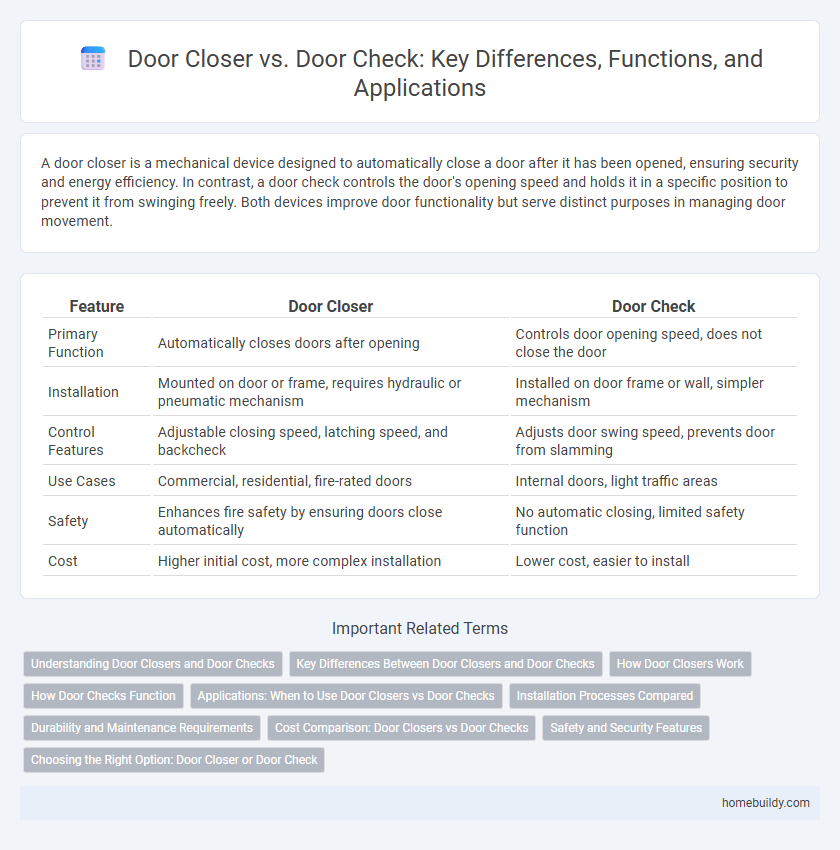A door closer is a mechanical device designed to automatically close a door after it has been opened, ensuring security and energy efficiency. In contrast, a door check controls the door's opening speed and holds it in a specific position to prevent it from swinging freely. Both devices improve door functionality but serve distinct purposes in managing door movement.
Table of Comparison
| Feature | Door Closer | Door Check |
|---|---|---|
| Primary Function | Automatically closes doors after opening | Controls door opening speed, does not close the door |
| Installation | Mounted on door or frame, requires hydraulic or pneumatic mechanism | Installed on door frame or wall, simpler mechanism |
| Control Features | Adjustable closing speed, latching speed, and backcheck | Adjusts door swing speed, prevents door from slamming |
| Use Cases | Commercial, residential, fire-rated doors | Internal doors, light traffic areas |
| Safety | Enhances fire safety by ensuring doors close automatically | No automatic closing, limited safety function |
| Cost | Higher initial cost, more complex installation | Lower cost, easier to install |
Understanding Door Closers and Door Checks
Door closers are mechanical devices designed to automatically close doors after they have been opened, ensuring security and energy efficiency in buildings. Door checks, on the other hand, primarily regulate the door's opening speed and hold it at a certain position without fully closing it. Understanding the distinction between door closers and door checks helps in selecting the right hardware for controlling door movement and improving safety compliance in commercial and residential settings.
Key Differences Between Door Closers and Door Checks
Door closers are mechanical devices designed to automatically close doors after opening, ensuring security and energy efficiency, while door checks primarily control the speed and force of door movement to prevent slamming. Door closers typically feature adjustable closing speed, latching speed, and backcheck functions; door checks focus on smooth, controlled door operation without fully closing the door. Understanding these distinctions helps in selecting the appropriate hardware for specific architectural and safety requirements.
How Door Closers Work
Door closers use hydraulic or pneumatic mechanisms to control the speed and force of a door closing, ensuring it shuts smoothly and securely after being opened. Unlike door checks, which primarily hold a door open or slow its motion without fully closing it, door closers regulate the entire closing process from open to shut. This mechanism improves security, energy efficiency, and fire safety by preventing doors from slamming or remaining open unintentionally.
How Door Checks Function
Door checks function by controlling the speed and force with which a door closes, ensuring smooth and safe operation without slamming. Unlike door closers that typically use hydraulic or pneumatic mechanisms to automatically return the door to a closed position, door checks primarily restrict door movement and prevent it from opening beyond a set angle. This mechanism reduces wear on hinges and enhances safety by moderating door motion during use.
Applications: When to Use Door Closers vs Door Checks
Door closers are ideal for commercial and high-traffic areas requiring controlled and automatic door closing to ensure security and energy efficiency, such as office buildings and hospitals. Door checks are better suited for lighter applications like residential settings or small offices where the primary need is to slow door movement without fully controlling the closing process. Choosing between door closers and door checks depends on the level of control, frequency of use, and safety requirements specific to the door's location and function.
Installation Processes Compared
Door closers and door checks differ significantly in installation processes, with door closers typically requiring more complex mounting involving precise alignment on the door and frame to ensure smooth automatic closing and controlled speed. Door checks, often simpler devices, usually involve straightforward installation with fewer components, primarily limiting the door's opening angle without actively closing it. Proper installation of door closers demands careful selection based on door weight and size, often needing professionals to calibrate hydraulic arms for optimal performance, whereas door checks are more user-friendly and easier to install on-site.
Durability and Maintenance Requirements
Door closers offer superior durability compared to door checks due to their robust hydraulic mechanisms designed for frequent use and heavy door weights. They require minimal maintenance, typically periodic lubrication and adjustment, ensuring long-term reliability. In contrast, door checks often experience faster wear and may need more frequent repairs or replacements, impacting overall maintenance costs.
Cost Comparison: Door Closers vs Door Checks
Door closers generally have a higher upfront cost than door checks due to their complex hydraulic mechanisms and enhanced durability. Door checks, being simpler devices, usually cost less but may require more frequent maintenance and replacement over time, increasing long-term expenses. Considering total cost of ownership, door closers provide better value in high-traffic or commercial settings by reducing wear and ensuring consistent door operation.
Safety and Security Features
Door closers provide controlled, automatic door closing to enhance fire safety compliance and prevent unauthorized entry, ensuring consistent sealing and protection. Door checks, while also regulating door movement, focus more on holding doors open or preventing slamming, offering less comprehensive security and limited fire safety benefits. Advanced door closers often integrate with access control systems for improved security monitoring, unlike standard door checks.
Choosing the Right Option: Door Closer or Door Check
Choosing between a door closer and a door check depends on the desired functionality and control level for door operation. Door closers provide automated closing with adjustable speed and force, enhancing security and energy efficiency, while door checks primarily regulate the door's open position to prevent slamming or uncontrolled movement. Selecting the right option involves evaluating factors such as door weight, usage frequency, and safety requirements to ensure optimal performance and durability.
Door closer vs Door check Infographic

 homebuildy.com
homebuildy.com